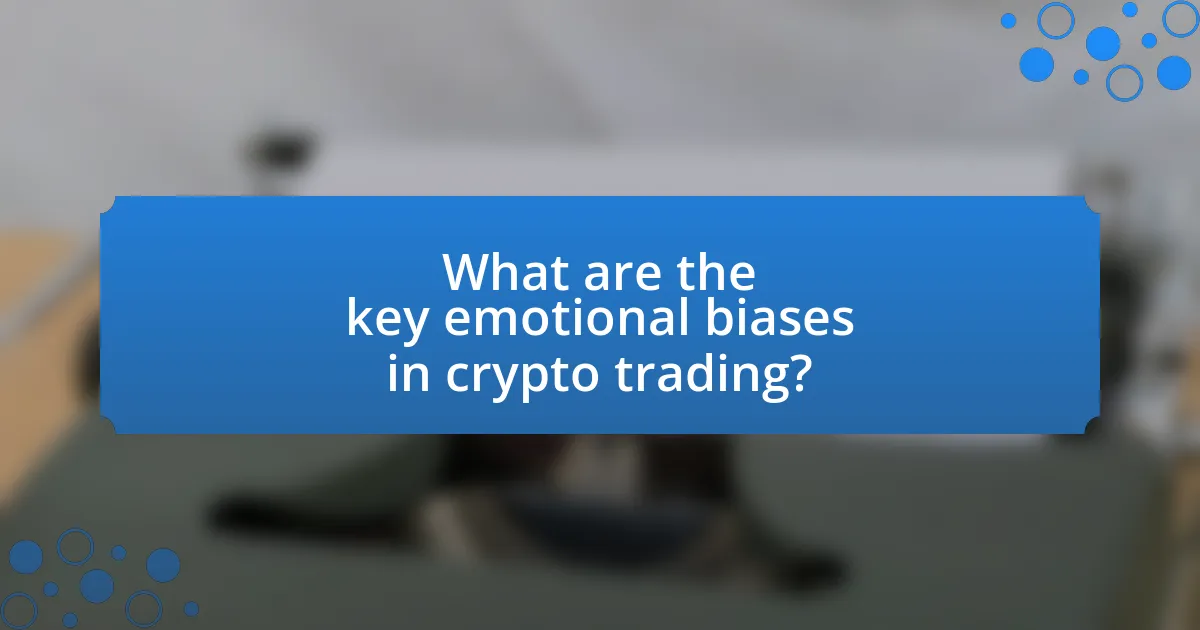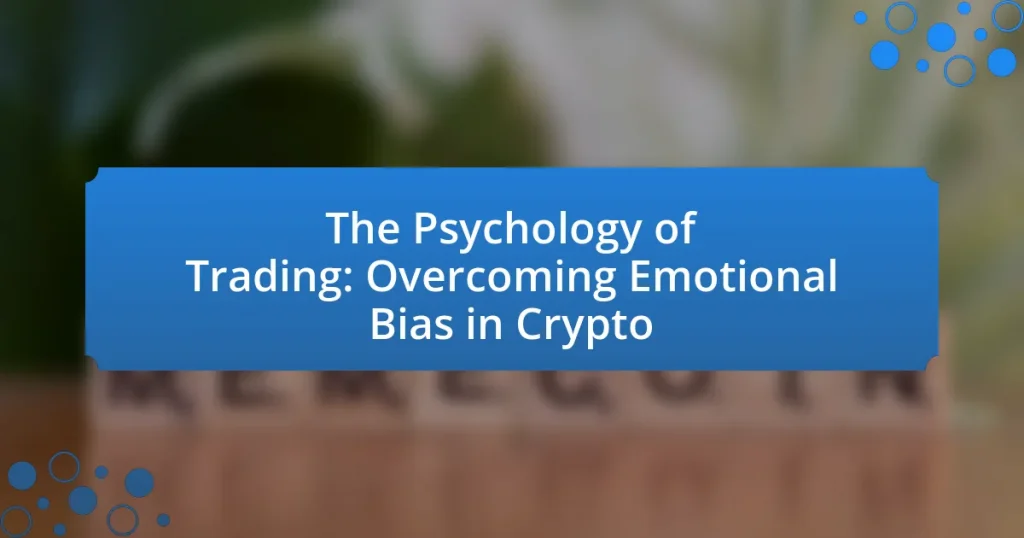The article focuses on the psychology of trading in the cryptocurrency market, emphasizing the emotional and cognitive biases that affect traders’ decision-making. Key topics include the influence of emotions such as fear and greed, common biases like overconfidence and loss aversion, and their impact on trading performance. The article also explores strategies for overcoming these biases, including the development of structured trading plans, mindfulness practices, and the importance of emotional regulation. Additionally, it highlights the role of social support and available resources for traders seeking psychological guidance to enhance their trading outcomes.

What is the Psychology of Trading in Crypto?
The psychology of trading in crypto involves understanding the emotional and cognitive biases that influence traders’ decisions. Traders often experience fear, greed, and overconfidence, which can lead to irrational decision-making and significant financial losses. Research indicates that emotional responses can override rational analysis, causing traders to act impulsively during market volatility. For instance, a study published in the Journal of Behavioral Finance found that emotional trading can result in a 20% decrease in trading performance compared to more rational approaches. Understanding these psychological factors is crucial for developing effective trading strategies and improving overall performance in the volatile crypto market.
How do emotions influence trading decisions in the crypto market?
Emotions significantly influence trading decisions in the crypto market by driving irrational behavior and leading to impulsive actions. Traders often experience fear and greed, which can result in panic selling during market downturns or excessive buying during price surges. For instance, a study by the University of California found that emotional responses can lead to suboptimal trading outcomes, as traders may ignore fundamental analysis in favor of emotional reactions. This emotional volatility can exacerbate market fluctuations, as seen during events like the 2017 Bitcoin bubble, where investor enthusiasm led to unsustainable price increases followed by sharp corrections.
What are the common emotional biases traders face?
Traders commonly face emotional biases such as overconfidence, loss aversion, and herd behavior. Overconfidence leads traders to overestimate their knowledge and predictive abilities, often resulting in excessive risk-taking. Loss aversion causes traders to fear losses more than they value gains, which can lead to holding losing positions too long. Herd behavior drives traders to follow the crowd, often resulting in poor decision-making during market volatility. These biases are well-documented in behavioral finance literature, highlighting their impact on trading performance and decision-making processes.
How do these biases impact trading performance?
Biases significantly impair trading performance by leading to irrational decision-making and emotional reactions. For instance, confirmation bias causes traders to favor information that supports their existing beliefs, often resulting in missed opportunities or losses when contrary evidence arises. Additionally, loss aversion can lead traders to hold onto losing positions longer than advisable, hoping for a reversal, which can exacerbate losses. Research indicates that cognitive biases can lead to a 20% decrease in trading performance, as traders fail to act on objective data and instead rely on flawed reasoning.
Why is understanding psychological factors crucial for crypto traders?
Understanding psychological factors is crucial for crypto traders because these factors significantly influence decision-making and market behavior. Traders often experience emotions such as fear and greed, which can lead to irrational trading decisions, such as panic selling during market dips or overtrading during bullish trends. Research indicates that emotional biases can result in substantial financial losses; for instance, a study by the CFA Institute found that behavioral biases can lead to a 20% reduction in investment returns. Therefore, recognizing and managing these psychological influences is essential for making informed and rational trading choices in the volatile crypto market.
What role does psychology play in market volatility?
Psychology significantly influences market volatility by affecting traders’ decision-making processes. Emotional responses, such as fear and greed, can lead to irrational behaviors, causing rapid price fluctuations. For instance, during market downturns, fear can trigger panic selling, while in bullish markets, greed may drive excessive buying, both contributing to increased volatility. Research by Barberis and Thaler (2003) highlights how psychological biases, like overconfidence and loss aversion, impact trading behaviors, further exacerbating market swings. Thus, understanding psychological factors is crucial for comprehending and potentially mitigating market volatility.
How can psychological awareness improve trading strategies?
Psychological awareness can significantly enhance trading strategies by enabling traders to recognize and manage their emotional biases. By understanding their psychological triggers, traders can make more rational decisions, reducing the likelihood of impulsive actions driven by fear or greed. Research indicates that emotional regulation can lead to improved performance; for instance, a study published in the Journal of Behavioral Finance found that traders who practiced mindfulness showed better decision-making and reduced emotional interference in their trading activities. This awareness allows traders to stick to their strategies, adhere to risk management protocols, and ultimately achieve more consistent results in volatile markets like cryptocurrency.

What are the key emotional biases in crypto trading?
The key emotional biases in crypto trading include fear of missing out (FOMO), loss aversion, overconfidence, and herd mentality. FOMO drives traders to buy assets impulsively to avoid missing potential gains, often leading to poor decision-making. Loss aversion causes traders to hold onto losing positions longer than advisable, as they fear realizing losses. Overconfidence leads traders to overestimate their knowledge and predictive abilities, resulting in excessive risk-taking. Lastly, herd mentality compels traders to follow the crowd, often disregarding their own analysis, which can exacerbate market volatility. These biases are well-documented in behavioral finance literature, highlighting their significant impact on trading outcomes.
What is loss aversion and how does it affect traders?
Loss aversion is a psychological phenomenon where individuals prefer to avoid losses rather than acquiring equivalent gains, meaning the pain of losing is psychologically more impactful than the pleasure of gaining. This affects traders by leading them to hold onto losing positions longer than they should, hoping to avoid realizing a loss, which can result in greater financial detriment. Research by Kahneman and Tversky in their Prospect Theory illustrates that losses are perceived as twice as painful as gains are pleasurable, influencing traders to make irrational decisions that can hinder their overall performance in the market.
How can loss aversion lead to poor decision-making?
Loss aversion can lead to poor decision-making by causing individuals to prioritize avoiding losses over achieving gains, which often results in overly conservative choices. Research by Kahneman and Tversky in their Prospect Theory demonstrates that losses are perceived as more significant than equivalent gains, leading traders to hold onto losing positions longer than advisable, hoping to avoid realizing a loss. This behavior can prevent them from reallocating resources to more profitable opportunities, ultimately hindering their overall trading performance.
What strategies can mitigate the effects of loss aversion?
To mitigate the effects of loss aversion, traders can employ strategies such as setting predefined stop-loss orders and focusing on long-term investment goals. Predefined stop-loss orders help limit potential losses by automatically selling assets at a specified price, thereby reducing the emotional impact of loss aversion. Research indicates that traders who utilize stop-loss strategies experience less emotional distress during market downturns, as they have a clear plan in place (Baker & Nofsinger, 2010). Additionally, focusing on long-term goals encourages a broader perspective, allowing traders to view short-term losses as part of a larger investment strategy, which can diminish the psychological impact of loss aversion.
How does overconfidence manifest in crypto trading?
Overconfidence in crypto trading manifests through excessive risk-taking and an inflated belief in one’s ability to predict market movements. Traders often overestimate their knowledge and skills, leading them to make impulsive decisions without adequate analysis. For instance, a study by Barber and Odean (2001) found that overconfident investors traded more frequently, resulting in lower returns due to transaction costs and poor timing. This behavior is particularly pronounced in volatile markets like cryptocurrency, where rapid price fluctuations can reinforce traders’ misguided confidence, ultimately leading to significant financial losses.
What are the risks associated with overconfidence in trading?
Overconfidence in trading significantly increases the risk of substantial financial losses. Traders who overestimate their knowledge and abilities may take excessive risks, leading to poor decision-making and impulsive trades. Research indicates that overconfident traders often ignore critical market signals and fail to conduct thorough analyses, resulting in a higher likelihood of losses. For instance, a study published in the Journal of Finance found that overconfident investors tend to trade more frequently, which can erode returns due to transaction costs and poor timing. Additionally, overconfidence can lead to a lack of diversification, exposing traders to greater volatility and potential downturns in their portfolios.
How can traders manage their confidence levels effectively?
Traders can manage their confidence levels effectively by implementing structured risk management strategies and maintaining a disciplined trading routine. Structured risk management involves setting clear stop-loss orders and position sizes based on individual risk tolerance, which helps mitigate emotional reactions to market fluctuations. A disciplined trading routine includes consistent analysis of market conditions and adherence to a trading plan, reducing impulsive decisions driven by overconfidence or fear. Research indicates that traders who follow a systematic approach are less likely to experience emotional biases, leading to improved decision-making and overall performance in trading environments.

How can traders overcome emotional biases in crypto?
Traders can overcome emotional biases in crypto by implementing a structured trading plan that includes clear entry and exit strategies, risk management, and regular performance reviews. This approach minimizes impulsive decisions driven by emotions such as fear or greed. Research indicates that traders who adhere to a disciplined strategy are more likely to achieve consistent results, as evidenced by a study published in the Journal of Behavioral Finance, which found that systematic trading reduces the impact of emotional decision-making. Additionally, utilizing tools like stop-loss orders and automated trading systems can further help mitigate emotional influences, allowing traders to focus on data-driven decisions rather than emotional reactions.
What techniques can help traders manage their emotions?
Traders can manage their emotions effectively by employing techniques such as mindfulness meditation, journaling, and setting predefined trading plans. Mindfulness meditation helps traders develop awareness of their emotional states, allowing them to respond rather than react impulsively to market fluctuations. Journaling encourages traders to document their thoughts and feelings during trades, which can reveal patterns of emotional bias and improve decision-making. Additionally, establishing predefined trading plans with clear entry and exit points reduces emotional decision-making by providing a structured approach to trading. Research indicates that traders who utilize these techniques experience lower levels of stress and improved performance, as evidenced by a study published in the Journal of Behavioral Finance, which highlights the positive impact of emotional regulation on trading outcomes.
How does mindfulness practice benefit traders?
Mindfulness practice benefits traders by enhancing their emotional regulation and decision-making abilities. By cultivating present-moment awareness, traders can reduce impulsive reactions to market fluctuations, leading to more rational and calculated trading decisions. Research published in the Journal of Behavioral Finance indicates that mindfulness can significantly decrease emotional biases, such as fear and greed, which often cloud judgment in high-stakes trading environments. This improved emotional clarity allows traders to maintain focus and composure, ultimately contributing to better performance and risk management in volatile markets.
What role does journaling play in emotional regulation?
Journaling plays a significant role in emotional regulation by providing individuals with a structured outlet to express and process their emotions. This practice allows traders to reflect on their thoughts and feelings related to trading decisions, which can help identify patterns of emotional responses that may lead to biased decision-making. Research indicates that expressive writing can reduce emotional distress and enhance self-awareness, thereby improving emotional regulation. For instance, a study published in the Journal of Experimental Psychology found that individuals who engaged in expressive writing reported lower levels of anxiety and improved mood, which supports the effectiveness of journaling as a tool for managing emotions in high-stress environments like trading.
How can developing a trading plan reduce emotional bias?
Developing a trading plan can significantly reduce emotional bias by providing a structured framework for decision-making. This structure helps traders adhere to predefined strategies and rules, minimizing impulsive reactions driven by fear or greed. Research indicates that traders who follow a systematic approach are less likely to deviate from their strategies during market volatility, which is often when emotional biases are most pronounced. For instance, a study published in the Journal of Behavioral Finance found that traders with a clear plan experienced fewer emotional disruptions and made more rational decisions, leading to improved trading outcomes.
What elements should be included in an effective trading plan?
An effective trading plan should include clear objectives, risk management strategies, entry and exit criteria, and performance evaluation metrics. Clear objectives define the trader’s goals, such as profit targets and timeframes, which guide decision-making. Risk management strategies outline how much capital to risk on each trade, typically recommending no more than 1-2% of total capital per trade to mitigate losses. Entry and exit criteria specify the conditions under which trades will be initiated and closed, often based on technical indicators or market analysis. Performance evaluation metrics, such as win/loss ratios and return on investment, allow traders to assess their effectiveness and make necessary adjustments. These elements collectively help traders maintain discipline and reduce emotional bias, which is crucial in the volatile crypto market.
How does a trading plan help in maintaining discipline?
A trading plan helps in maintaining discipline by providing a structured framework for decision-making and risk management. This structure minimizes emotional reactions by outlining specific entry and exit points, position sizes, and risk tolerance levels. Research indicates that traders who adhere to a well-defined trading plan are less likely to deviate from their strategies during volatile market conditions, thereby reducing impulsive trading behaviors. For instance, a study published in the Journal of Behavioral Finance found that traders with a clear plan exhibited 30% fewer emotional trading decisions compared to those without one. This evidence supports the notion that a trading plan is essential for fostering discipline in trading activities.
What are some best practices for emotional resilience in trading?
Best practices for emotional resilience in trading include maintaining a disciplined trading plan, practicing mindfulness, and implementing regular self-reflection. A disciplined trading plan helps traders stick to their strategies, reducing impulsive decisions driven by emotions. Mindfulness techniques, such as meditation, can enhance emotional awareness and control, allowing traders to respond rather than react to market fluctuations. Regular self-reflection enables traders to assess their emotional responses to trades, fostering growth and adaptation. Research indicates that emotional regulation significantly impacts trading performance, with studies showing that traders who employ these practices experience lower stress levels and improved decision-making.
How can traders build a support network for emotional support?
Traders can build a support network for emotional support by actively engaging with fellow traders through online forums, social media groups, and local meetups. These platforms allow traders to share experiences, discuss challenges, and provide encouragement, which is crucial for managing the emotional highs and lows associated with trading. Research indicates that social support can significantly reduce stress and improve mental well-being, making it essential for traders to connect with others who understand their unique challenges. By participating in these communities, traders can foster relationships that offer both emotional and practical support, enhancing their resilience in the volatile crypto market.
What resources are available for traders seeking psychological guidance?
Traders seeking psychological guidance can access various resources, including online courses, books, and professional counseling services. Online platforms like Coursera and Udemy offer courses specifically focused on trading psychology, helping traders understand emotional biases and develop coping strategies. Books such as “The Psychology of Trading” by Brett N. Steenbarger provide in-depth insights into the mental aspects of trading. Additionally, professional counseling services, including therapists specializing in financial psychology, can offer personalized support to address emotional challenges faced by traders. These resources are validated by the growing recognition of the importance of psychological factors in trading success, as highlighted in studies that show emotional regulation significantly impacts trading performance.


